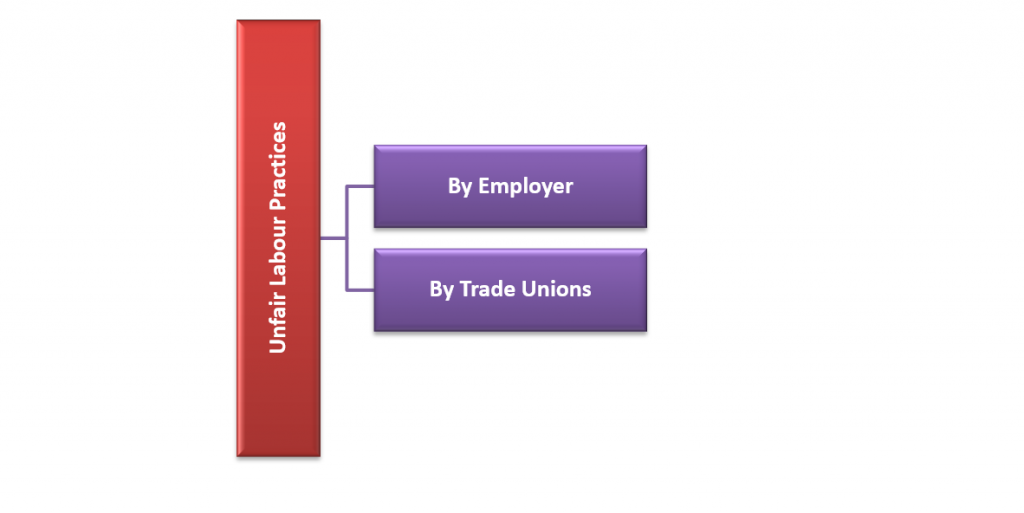Introduction
Unfair labour Practices as we know Work is a necessity for the economic growth and development of every country. It contributes to the production and manufacturing of goods and services, and in exchange, it receives wages as remuneration. An employer and employee together contribute to gaining revenue and profit, but the principle question that arises here is whether; is it so simple to work peacefully and enjoy the benefits ?
No, in every organization, whether public or private, several disputes arise between the employer and employee.
Either about fair wages, working hours, or trade union demands. To ensure and prevent such disputes and for the welfare of labourers or workmen and their employers, The Industrial Disputes Act of 1947 came into force.
The main objectives of this Act are to promote peace and welfare and create amicable relations between employers and labourers settle industrial disputes, prevent illegal strikes or unfair trade practices, enable employees to pursue their rights effectively, provide for the effective administration of labour laws, protect freedom of association, promote harmony between workers on different jobs at the same plant or elsewhere in the industry, ensure proper representation of workers by unions in management committees, etc.
Protecting the interests of weaker sections in society by providing safeguards against unfair discrimination by employers against them for no good reason except caste prejudice which should be treated as illegal at once under the Industrial Relation Act 1947.
Unfair Labour Practices: Industrial Dispute Act, 1947
Section 2 (ra) of the Industrial Dispute Act , 1947 defines” Unfair Labour Practice” as follows :
“ Unfair Labour Practice” means any of the practices specified in the fifth schedule of the act.
Fifth Schedule has been given in the section 24 (ra).
Section 25 U:
At present, Unfair Labour Practices under the Industrial Relations Code, of 2020 are specified in the Second Schedule, In the year 2020, Unfair Labour Practices under the Industrial Relations Code have been specified in the Second Schedule of the Industrial Dispute Act 1947. The list includes unfair labour practices by employers and trade unions alike. Provisions regarding prohibition of Unfair Labour Practices contained in Section 25 T of Industrial Dispute Act.
Unfair labour practices can be categorised in following ways:
- Unfair practices by Employer
- Unfair Practices by Trade Unions

Unfair practices by Employers :
Following are the unfair labour practices on the part of the employers as specified in
Part I of the Fifth Schedule of the Industrial Dispute Act 1947 . These include:
- The employer cannot prohibit their employees from joining or establishing any trade union or cannot interfere in their work.
- If an employee joins a union, the employer is not permitted to harass or control them.
- The employer cannot bully an employee for being a part of legal lock-outs or strikes.
- The employer cannot bully an employee for being a part of legal lock-outs or strikes.
- Imposing any penalty or giving threats to dismiss them from the services such as:
- Discharging or punishing a workman because he urged other workman to join or organise a trade union
- Discharging or dismissing a workman for taking part in any strike
- Changing seniority rating of workman because of the trade union activities
- Refusing to promote workman to higher posts on account of their trade union activities
Case Laws:
- In P.Rajgopal vs. Government of Andhra Pradesh 2006 petitioners were engaged as Security Guard in a public Service Company . After 15 years, their services were terminated with promise to re-engage as and when the vacancy arises to the said posts. But the respondent refused to engage any security staff from retrenched petitioners and engaged other security staff on contract basis. Such an act was held to be an unfair practice on the part of the employer under Section 2 (ra) of Industrial Dispute Act, 1947.
- In executive Engineer, M.P. Housing Board Indore vs. Ramesh 2006 the Supreme court held that giving artificial breaks in service in order to deprive the workmen of their status of regular workers amounts to unfair labour practices.
Unfair Practices by Trade Unions :
Unfair labour practices are not only done by employers, trade unions also sometimes contribute to unfair labour practices. The Fifth Schedule of the Industrial Dispute Act mentions the following practices which are prohibited for trade unions:
- Promoting and supporting illegal strikes.
- Threatening the workers to join trade unions.
- Prohibiting any worker from entering the workplace who is not participating in illegal strikes.
- Using criminal force against workers who are not participating in strikes or lockouts that are not permitted as per the provisions of the legislation.
- Not aiming for workers’ welfare. Refusing collective bargaining as representatives of workmen.
- Entering the residence of the employers and damaging their personal property.
Constitutional Provisions:
To determine if an employer has engaged in unfair labour practice, it is important to take into account the directive principles of state policy contained in Article 43 of the Constitution and such other articles as dealing with decent wages and living conditions for workmen. An employer may not violate any of these directives by paying less than a fair wage or requiring workers to work in unsafe conditions. These practices may be considered unfair under the law because they are against the interests of workers and violate their rights.
Penalty for committing unfair labour practices :
According to section 25-U any person who commits unfair labour practices shall be punishable with:
- Imprisonment for a term which may extend to six months or
- With fine which may extend to one thousand rupees or
- With both.



